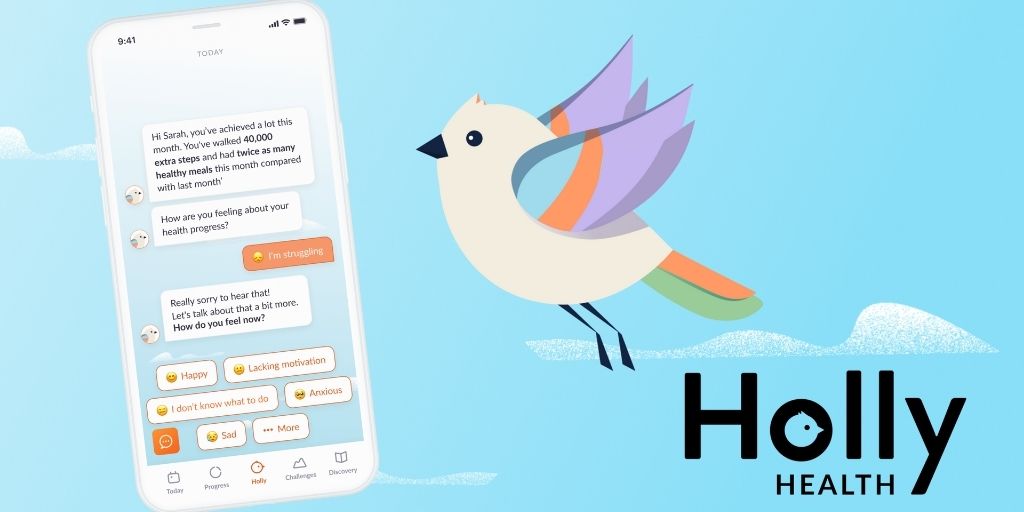
Today, Holly Health launches a new £100,000 initiative to support NHS workers and people on a waiting list for mental health services. The ORCHA-approved digital support tool is designed to provide mental health support, prevent burnout, or help regain control after episodes of exhaustion and can be downloaded for free here for NHS staff, and here for people who are on a waiting list for mental health support, with 2000 free spaces available in total.
Mental health waiting lists at an all time high
It is estimated that 8.5 million adults will require mental health support as a direct impact of the pandemic. Waiting lists for mental health services are also at an all-time high with 1.5 million people currently awaiting support for eating disorders, addictions, severe anxiety or depression. In September 2021, it was reported that on average, every seven seconds a person was referred for NHS mental health support in England. Holly Health can provide immediate help, whether someone is waiting to access NHS services or to complement existing care.
Grace Gimson, qualified health coach and CEO of Holly Health, says: “Mental health challenges are on the rise, however access to care is decreasing year-on-year. The last couple of years have really taken their toll on access to mental health services and COVID has further compounded this issue, with people waiting months or even years for treatment.
“Evidence shows that people’s health often declines while waiting for access to therapy…that’s where Holly Health comes in. We aim to bridge the ‘waiting list’ gap by offering people mental health support, via a personalised health coach app, while they are waiting for further medical treatment. This winter will be challenging and people will be in need of mental health support more than ever!”
NHS staff are exhausted
NHS Providers revealed that 92% of hospital trusts had concerns about staff wellbeing, stress and burnout following the pandemic.2 The parliamentary inquiry into Workforce Burnout and Resilience in the NHS and Social Care showed a ‘worrying’ amount of evidence pointing towards ‘exhaustion of large groups of NHS staff’. Although staff shortages are the biggest driver of workforce burnout, Holly Health advocates that greater separation between work and home life can improve mental and overall health.
Grace adds:
“We also want to support those working in our national health services to recognise that, without protecting their own health as a priority, they will struggle to care for those around them over the long term. Prioritising their own health at a time like this, when they’re faced with so many pressures, is never going to be easy, but at Holly Health we want to be a part of the solution for all those working so hard to keep us healthy and well 365 days a year, pandemic or no pandemic.”
For NHS staff, the pathway – and timeframe – to getting mental health support is no different to the general public. Whilst some workplaces have been able to offer additional support to NHS staff in the wake of the pandemic, in the form of counselling and occupational therapy, the impact of COVID on workloads means that NHS staff simply don’t have the time to take up these services. To address this and ensure that these critical key workers are still able to access support, Holly Health’s digital health coach offers personalised coaching, nudges and motivation, to fit around people’s lives, however busy or overworked they may be.
Burnout and work-related stress
Holly Health is a digital coach that combines compassion with science to help users find their life rhythm – free from burnout – for lasting improvements to physical, mental and emotional health. The app has already helped over 10,000 people to take back control of their lives. The company and its founders, Grace Gimson and Claire Wu, believe that everything from nutrition, activity, sleep and stress has an impact on a person’s overall health. The app and its friendly coach ‘The Holly Bird’ helps users to create small incremental behaviours to improve long term wellbeing
Work-related stress has a wide range of consequences. NHS staff are 50% more likely to experience high levels of work-related stress than the general working population, according to The King’s Fund. Poor staff health and wellbeing are also linked with turnover and intention to quit, along with higher levels of patient mortality in the acute sector. Burnout can also have an
Catalina Pearce, a mental health practitioner and founder of Cognitive Mind Coaching says: “Over the last few years I have been seeing up to 8 clients a day to support them with mental health. Along with my colleagues, we were supporting people who had been waiting a long time to get mental health support. With a rise in mental health difficulties related to COVID, coupled with the staff absences COVID has created, keeping afloat has become increasingly tough and burnout has become more common amongst health care workers. Without looking after ourselves and prioritising our own mental health, the quality of care will eventually be affected. Services like Holly Health encourage health care workers to focus on their own wellbeing, and gives patients invaluable guidance whilst they wait for in-person care. Since starting my own wellbeing business, I have been grateful for Holly Health as a tool for myself, as well as to support my clients in their goals.”
Holly Health’s promotion is running until all 2000 free spaces are taken.








